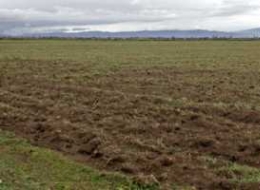
Civil society has notes and question marks with respect to amendments to the law on "Agricultural Land Ownership", which imposes new regulations on the sale of land to foreigners.
NGOs are dissatisfied with the government's draft law and have claims against the government due to the fact that civil society was not involved in the work on the project.
Chairwoman of Georgian Farmers' Association Nino Zambakhidze states “Commersant " that the point about foreigner’s agricultural practices raises the question, according to which, foreign citizens can purchase agricultural land only if they have experience in agricultural activities in the country for at least 5 years. Zambakhidze wonders who will register and confirm a 5-year experience, and what is considered agricultural farm.
She says the draft law determines that the Georgian side should own a controlling interest in land acquisition, with this condition foreign investors will not want to enter the market.
In his words, neither their organization nor "Transparency International Georgia" were involved in the project development process.
According to the NGO’s parliamentary secretary Lika Sajaia, the non-governmental sector had to be involved in the work on such a very important law..
Sajaia believes that due to the lack of communication, the bill raises questions today. "Transparency International" also has claims with respect to a point about foreign natural or legal person’s 5 -yearexperience in agricultural field.
In her words, the law bans the sale of agricultural land in the 5-kilometer zone of the country's borders and border areas identified by the Government to foreign citizens or companies established by foreigners and registered in Georgia. But the initiative says nothing about the conflict zones, which are more problematic than the border because they are less controlled.
Non-governmental organizations find that special attention should be paid to this issue.
As to the question whether the law is discriminatory towards foreigners, LikaSajaia considers that similar regulations are enacted in many developed countries, and it's natural.
The government of Georgia made changes to the law on agricultural land that regulate the sale of this kind of land to foreign nationals on September 19. The bill was presented to the government by the Minister of Justice.
In particular, the government makes ban on the sale of agricultural land in the 5-kilometer zone of the country's borders and border areas identified by the Government to foreign citizens or companies established by foreigners and registered in Georgia.
At the same time, a foreign citizen can obtain land in such an area as a legacy - according to developers of changes in the law, it will allow to receive the land title to Georgians living abroad or having foreign citizenship.In the case of marriage of a foreign citizen to a citizen of Georgia, land may be in the common property,in the event of divorce a citizen of Georgia has a preferential right to purchase the site, and the foreign national will be required to sell it.
Natural or legal persons established in Georgia by foreign nationals can purchase agricultural land only if they have experience in agricultural activities in the country for at least 5 years, individuals are also required to have a residence permit in Georgia.
According to Economy Minister Giorgi Kvirikashvili, similar restrictions on the purchase of agricultural land operate in many countries, including developed.
"These restrictions are in force in many European countries, and we are not forced to be ultra-liberal in this matter. Economic growth is very good, but each country has its own peculiarities. Georgia is a country with little land located in a complicated region, and therefore, specific regulations must exist, "- the Minister states.
According to one of the developers of changes in the law, the Minister of Justice Tea Tsulukiani, a selected model is the most balanced, since on the one hand, it gives the country an opportunity to defend its national interests, on the other - protects the rights of investors.
Souce:commersant.ge |